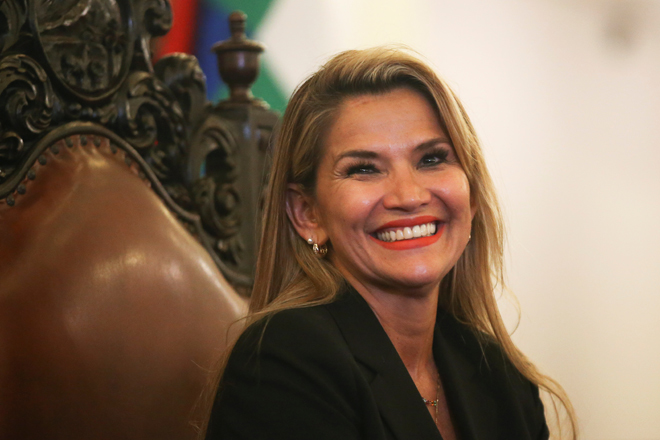With the Bible in hand and a phrase - "First God" -, the woman who has taken the place of Evo after his escape comes from a poor family
The soap opera of Evo Morales: a young woman, a "resurrected" baby and a reelection
At first glance, the new president of Bolivia, Jeanine Áñez , is a glamorous woman, with blonde hair, elegant and good-natured. Characteristics that made the "Angelina Jolie of the Legislative" be called in the corridors of the Parliament.
A nickname that is now diluted by assuming his new position, since as his daughter said for LOC, Carolina Ribero Áñez, for this medium: "No one ever imagined that he would occupy the presidential chair" , but on November 12 after the resignation of President Evo Morales, and a wave of resignations -which included that of the vice president, the presidency of the Senate, that of the Deputies and the first vice-presidency of the Senaduría-, his position was the following by succession to occupy the Presidency.
Thus Áñez, after a frustrated attempt, for lack of quorum -as dictated by the Political Constitution-, of a legislative assembly to designate who would be the replacement of Morales, arrived last Tuesday night at the old Government Palace in La Paz and before the population, with the Police involved, and with the Holy Scriptures in their hands, said: "They have allowed the Bible to re-enter the Government Palace . " With those words, she premiered as the sixty-sixth president of the Plurinational State of Bolivia.
Jeanine Áñez was born on June 13, 1967 in San Joaquín, a small town in the department of Beni, northwest of the country. She is the youngest of nine siblings of a lower-middle class family. Now she is the second woman to occupy the presidential command in Bolivian history, but before that, her political life dates back to two legislatures as a state senator, the first from 2010 to 2015 and the second from 2015 that should end in 2020. both, being contrary to the government of Evo Morales as part of the opposition alliance, Democratic Unit.
Before entering politics, Áñez's life was very different from what it can reflect today. "Physically they see her as a well-off woman, but people do not know the life she has had and what has happened . She comes from a regular family in a town in Beni, she has had to go to work before studying," said her Carolina daughter
Her first job was at age 17 as a company secretary, then she moved to La Paz and there she met who her husband and father of her two children would be.
"There is a lot of machismo in Beni , my father never liked that she studied, but she was determined to study, and with all her effort she went ahead by her own means," says Carolina.
After a few years, Áñez returned to Beni, graduated as a lawyer and began her television career as a news anchor . Being one of the few women of that city to be in the media, it generated a good impression before the population, so they called her to be part of what would be the Constituent Assembly. It was the starting point of his career in politics. Thanks to that participation, the National Convergence party summoned it to occupy the position of senator for Beni.
Áñez always gave an image of a legislator without fear and determined to express opinions of what she considered important for the religion she represents. With a lot of presence and character, she was involved in some controversies over opinions expressed on the Whipala flag, an emblem that Evo Morales became a national symbol of Bolivia .
On one occasion, during a Constituent Assembly of 2009, he said: "In my region we do not want to be the Collasuyo [indigenous region], we do not want a flag like the Whipala, we always want to be Bolivia, a red, yellow and green flag, with the one we were born as a country. " Although on Tuesday, the now president took the floor to say that what she seeks with this new mandate is the pacification and union of the country.
Therefore, he referred again to the subject: "I want to tell my dear and diverse Bolivian people that I have instructed that our Whipala be kept together with our sacred tricolor. We are a plural and diverse country, but we are all the same."
Another important issue that has given to talk is the religious. During his years as part of the Upper House, he criticized a lot that Morales' party turned the country into a secular state, stating that the customs promoted by the Government were "satanic rites." Hence his phrase: "First God." "He has always been very believing, that's why he leaves everything in the hands of God," concludes Carolina.
According to the criteria of
Know more

